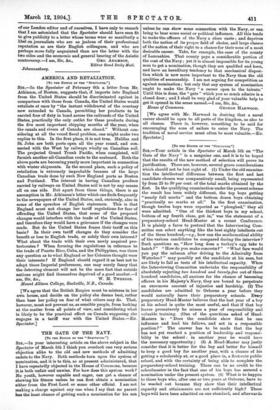AMERICA AND RETALIATION.
[To THE EDITOR OP TH2 " SPRCTATOR."] SrE,—In the Spectator of February 6th a letter from Mr. Atkinson, of Boston, suggests that, if imports into England
from the United States should be discriminated against in comparison with those from Canada, the United States would retaliate at once by "the instant withdrawal of the courtesy now extended to Canada, permitting her products to be carried free of duty in bond across the railroads of the United States, practically the only outlet for these products during the five most important shipping months of the year, when the canals and rivers of Canada are closed." Without con- sidering at all the vexed fiscal problem, one might make two replies to this. In the first place, it is not true. Halifax and St. John are both ports open all the year round, and con- nected with the West by railways wholly on Canadian soil.
The projected Grand Trunk Pacific, when completed, will furnish another all-Canadian route to the seaboard. Both the above ports are 'becoming yearly more important in connection with winter shipments. In the second place, such a policy of retaliation is extremely improbable because of the large Canadian trade done by such New England ports as Boston and Portland. The interest in having Canadian produce carried by railways on United States soil is not by any means all on one side. But apart from these things, there is an assumption in Mr. Atkinson's letter which one finds frequently in the newspapers of the United States, and, curiously, also in some of the speeches of English statesmen. This is that England must not change her tariff regulations for fear of offending the United States, that some of the proposed changes would interfere with the trade of the United States, and therefore they would have a grievance if the changes were made. But do the United States frame their tariff on this basis ? In their own tariff changes do they consider the benefit or loss to English trade, or solely their own interest? What about the trade with their own newly acquired pro- tectorates? When forming the regulations in reference to the trade of Puerto Rico, Cuba, and the Philippines, was there any question as to what England or her Colonies thought were their interests ? If England should regard it as best not to adopt these Imperial preferences, one may surely fancy that the deterring element will not be the mere fact that outside nations might find themselves deprived of a good market.—I
am, Sir, &c., W. M. TWEEDIE. Mount Allison College, Sackville, N.B., Canada.
[We agree that the British Empire must be mistress in her own house, and decide on the policy she deems best, rather than base her policy on fear of what others may do. That, however, must not prevent us, as sensible people, from looking at the matter from all points of view, and considering what is likely to be the practical effect on Canada supposing she engages in a tariff war with the United States.—En. Spectator.]










































 Previous page
Previous page